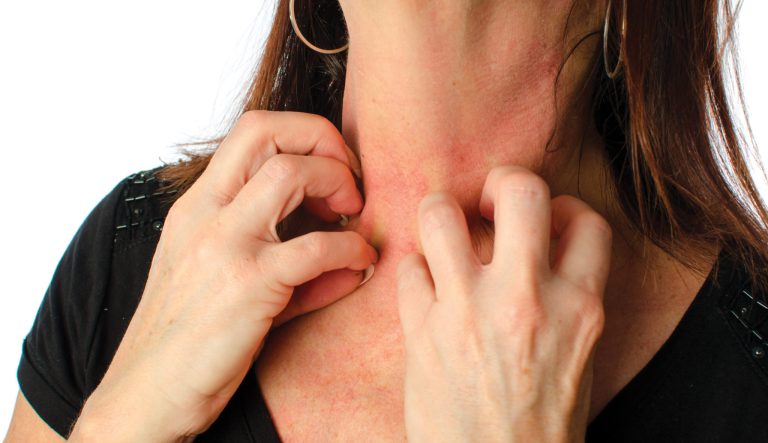Thank you for downloading!
Subscribe to our newsletter to receive email updates about our work, get connected and support Australians impacted by eczema. You can unsubscribe at any time.
Subscribe NowEczema is a complex condition that is influenced by genetic and environmental factors. It isn’t contagious and research suggests it’s linked to an autoimmune disorder in which the immune system becomes overactive.
People with atopic eczema have a defective skin barrier, making it difficult to protect themselves against irritants and allergens, leading to flare-ups and potential infections. It also increases their risk of experiencing other allergic conditions such as asthma, hay fever or food allergies, as well as sensitivity to allergens such as dust mites, pollen and pet dander.
Eczema can be experienced in different forms other than atopic eczema, including discoid eczema, seborrheic eczema and hand and foot eczema. Because it isn’t a one-size-fits-all condition, eczema causes and triggers can vary and symptoms and severity can differ greatly and change over time.
With eczema symptoms varying from person to person, identifying specific triggers to control flare-ups can be a challenge. Since flare-ups are rarely triggered by just one individual cause, it can be frustrating to pinpoint exactly what’s setting off your symptoms.
Some common triggers include:
By identifying and managing these triggers, you can help minimise flare-ups and better control your eczema symptoms.

The connection between eczema and food triggers is complex, and while certain food allergies can contribute to flare-ups, they are not the sole cause of the condition. Research indicates that eczema may actually increase the risk of developing food allergies, particularly in children who come into contact with allergens through their skin, such as from food or plant-based products. According to the Australasian Society of Clinical Immunology and Allergy (ASCIA), about 30% of infants with eczema and a family history of allergies develop food allergies, compared to only 10% of the general population.
Parents need to be mindful of their child’s diet when managing their eczema, but food exclusion diets should only be tried after other treatments, such as moisturisers, non-soap-based washes, or topical steroids, have been tested under medical supervision. Allergy tests aren’t always accurate in predicting food-related eczema triggers, and eliminating foods without proper substitutes can lead to malnutrition or poor growth. If a child is eating certain foods without reaction, removing those foods may actually cause them to develop a new allergy. If there are signs beyond eczema flare-ups, such as hives or vomiting, consult an allergist and keep a detailed record of ingredients and symptoms for better diagnosis.

Unfortunately, there is no cure for eczema, but being aware of your condition, avoiding triggers and managing your symptoms can help improve your quality of life and avoid flare-ups. In most cases, there isn’t one thing that will fix eczema or prevent flare-ups, it’s a complex condition that is different for everyone. Visit our Eczema Care Online Toolkit to find out the best way to manage your symptoms.
Eczema triggers can vary greatly from person to person, and flare-ups are often caused by more than one factor. Common triggers include dry skin, stress, certain fabrics (e.g., wool, polyester), pet dander, soaps, detergents, allergens like dust mites and pollen, environmental conditions (e.g., dry or humid weather), and even viral infections. Skin allergens like perfumes, preservatives, and metals like nickel can also complicate eczema symptoms.
Use our Eczema Care Online Toolkit to find out the best way to care for your eczema or your child's eczema.
Subscribe to our newsletter to receive email updates about our work, get connected and support Australians impacted by eczema. You can unsubscribe at any time.
Subscribe Now